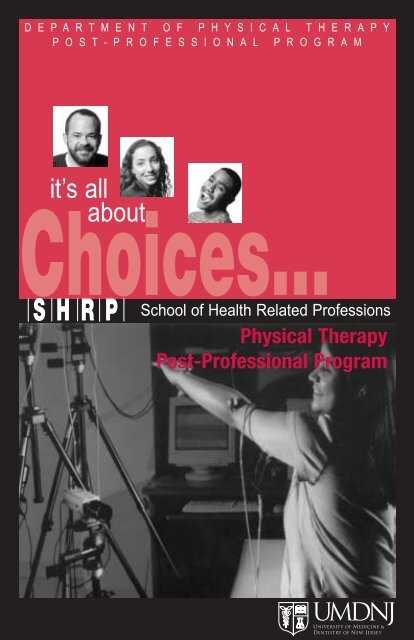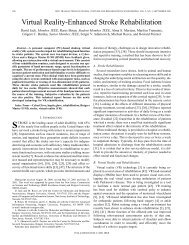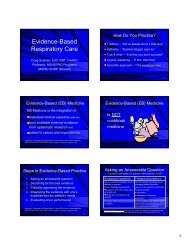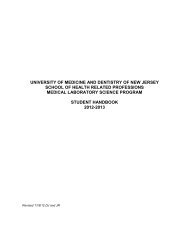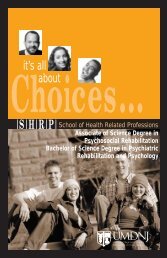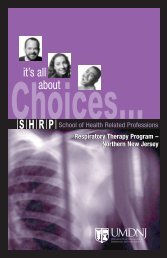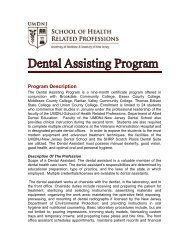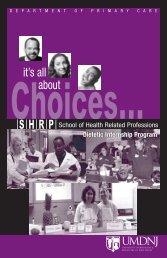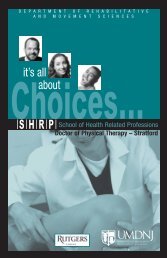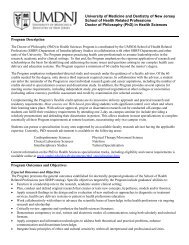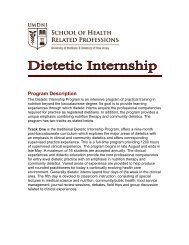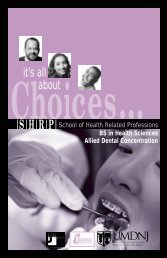about - School of Health Related Professions
about - School of Health Related Professions
about - School of Health Related Professions
Create successful ePaper yourself
Turn your PDF publications into a flip-book with our unique Google optimized e-Paper software.
D E P A R T M E N T O F P H Y S I C A L T H E R A P Y<br />
P O S T - P R O F E S S I O N A L P R O G R A M<br />
it’s all<br />
<strong>about</strong><br />
Choices…<br />
<strong>School</strong> <strong>of</strong> <strong>Health</strong> <strong>Related</strong> Pr<strong>of</strong>essions<br />
S H R P<br />
Physical Therapy<br />
Post-Pr<strong>of</strong>essional Program
DEPARTMENT OF PHYSICAL THERAPY<br />
POST-PROFESSIONAL PROGRAM<br />
Choices…<br />
Students who choose UMDNJ’s <strong>School</strong> <strong>of</strong> <strong>Health</strong> <strong>Related</strong><br />
Pr<strong>of</strong>essions want a University that is exclusively dedicated<br />
to health care, with state-<strong>of</strong>-the-art equipment, rigorous<br />
coursework, and faculty who cares. All our resources go<br />
toward supporting a health care educational environment<br />
that attracts and nurtures the very best faculty and students.
UMDNJ<br />
The University <strong>of</strong> Medicine and Dentistry <strong>of</strong> New Jersey (UMDNJ) is<br />
the nation’s largest independent public health-sciences university, with<br />
programs at five main academic healthcare campuses in Camden, New<br />
Brunswick/Piscataway, Newark, Scotch Plains and Stratford.<br />
UMDNJ is dedicated to the pursuit <strong>of</strong> excellence in: the<br />
undergraduate, graduate, postgraduate and continuing education <strong>of</strong><br />
health pr<strong>of</strong>essionals and scientists; the conduct <strong>of</strong> basic biomedical,<br />
psychosocial, clinical and public health research; health promotion,<br />
disease prevention and the delivery <strong>of</strong> healthcare; and service to our<br />
communities and the entire state.<br />
Program<br />
The Physical Therapy Program <strong>of</strong> the University <strong>of</strong> Medicine and<br />
Dentistry <strong>of</strong> New Jersey specializes in doctoral-level education for<br />
physical therapists and for individuals wishing to become physical<br />
therapists. Students in our entry-level Doctor <strong>of</strong> Physical Therapy<br />
(DPT) program receive a state-<strong>of</strong>-the-art education that prepares<br />
them to be in the forefront <strong>of</strong> the physical therapy pr<strong>of</strong>ession. Our<br />
post-pr<strong>of</strong>essional DPT is designed to help practicing physical<br />
therapists develop the tools and strategies they need to excel in a<br />
Page 1
constantly changing health care environment. We also <strong>of</strong>fer a PhD in<br />
<strong>Health</strong> Sciences degree, to prepare pr<strong>of</strong>essionals for leadership<br />
positions in research and academia. The physical therapy faculty<br />
possesses outstanding qualifications and attributes that, coupled with<br />
an exceptional curriculum, account for the excellence <strong>of</strong> these<br />
programs. The program facilities include a premiere health-sciences<br />
library, two fully equipped research labs (The Research in Virtual<br />
Environments and Rehabilitation Sciences [RIVERS] Lab and an<br />
exercise physiology lab), new classroom facilities and two computer<br />
laboratories. The UMDNJ Physical Therapy program serves the<br />
community through its faculty practice which provides occupational<br />
and physical therapy to the school children in Newark and Paterson, as<br />
well as through its participation in the University’s association with<br />
Special Olympics. The Physical Therapy program is housed within the<br />
largest independent public health-sciences university in the country,<br />
affording numerous opportunities for diverse clinical experiences.
Doctoral Programs:<br />
Entry-Level Doctor <strong>of</strong> Physical Therapy (DPT) is a full time<br />
three-year program that prepares students to enter the physical<br />
therapy pr<strong>of</strong>ession. This comprehensive 110 credit graduate program<br />
prepares students for leadership roles within the pr<strong>of</strong>ession through<br />
its vibrant and supportive educational environment that attracts and<br />
nurtures the very best faculty and students. The physical therapy<br />
department has a rich tradition <strong>of</strong> academic excellence in education,<br />
research, patient care and community service.<br />
Post Pr<strong>of</strong>essional Doctor <strong>of</strong> Physical Therapy (DPT) is designed<br />
for practicing clinicians, who already possess a bachelor’s or master’s<br />
degree in Physical Therapy, to expand their knowledge in differential<br />
diagnosis, ethics, scholarship, evidence–based practice and management in<br />
order to develop the tools and strategies they need to excel in the current<br />
health care environment. Using a schedule <strong>of</strong> evening and weekend courses<br />
the program affords quality, flexibility, and convenience.<br />
Doctor <strong>of</strong> Philosophy In <strong>Health</strong> sciences (PhD) prepares students<br />
for research and teaching careers. The Program is based on a mentoring<br />
model <strong>of</strong> graduate education, with emphasis on independent/directed<br />
study and research under the guidance <strong>of</strong> a faculty advisor. Of the 60<br />
credits needed for the degree, only <strong>about</strong> a third represent required<br />
preparatory core and methods courses. In collaboration with the advisor,<br />
the remainder <strong>of</strong> the program is individually tailored to meet students'<br />
research goals and career expectations.<br />
Page 3
Why Choose UMDNJ?<br />
• Quality and Experience - We have been educating physical<br />
therapists since 1980 through our accredited pr<strong>of</strong>essional programs.<br />
Of our 13 experienced faculty members, the majority have doctorates,<br />
and many are clinical specialists. Faculty members are your colleagues,<br />
and have served at the state and national level in numerous capacities;<br />
as state delegates, committee chairs, district <strong>of</strong>ficers, State Board<br />
President, and many others. Many faculty members continue to<br />
practice in New Jersey and understand the challenges you face in<br />
today’s health care environment.<br />
• Cost - As a state school, our tuition is substantially lower than that<br />
charged by private schools. Our graduate tuition is 40% to 70% less<br />
than other DPT programs in the region.<br />
• Convenience - Our post-pr<strong>of</strong>essional courses are <strong>of</strong>fered evenings<br />
and weekends at our main campus in Newark. Web-based courses add<br />
to the flexibility <strong>of</strong> the curriculum. Newark is easily reached by public<br />
transportation, and parking is available on campus.<br />
• Flexibility - Our post-pr<strong>of</strong>essional DPT is geared toward all licensed<br />
physical therapists, regardless <strong>of</strong> entry-level degree. Previous graduate<br />
coursework and pr<strong>of</strong>essional experienced will be granted transfer<br />
credit based on evaluation <strong>of</strong> each individual’s transcript, resume, and<br />
supporting documentation.
Program Description<br />
The post-pr<strong>of</strong>essional Doctor <strong>of</strong> Physical Therapy program at UMDNJ is<br />
designed to help practicing physical therapists develop the tools and<br />
strategies they need to excel in a constantly changing health care<br />
environment. Our curriculum was developed to prepare physical<br />
therapists to meet head-on the challenges facing them in today’s health<br />
care world: an explosion <strong>of</strong> knowledge and the expectation <strong>of</strong> evidencebased<br />
practice, increasing responsibility paralleling increasing autonomy,<br />
changes in reimbursement and constraints imposed on the therapistpatient<br />
relationship. To teach this curriculum we draw on our twelve fulltime<br />
faculty as well as content experts from across the country. Our<br />
diverse faculty share with students the knowledge and experience they<br />
have gained through extensive clinical, pr<strong>of</strong>essional, academic and<br />
research activities.<br />
The program is designed to meet the needs <strong>of</strong> busy pr<strong>of</strong>essionals. Classes<br />
are <strong>of</strong>fered evenings and weekends. Use <strong>of</strong> the world wide web increases<br />
the flexibility <strong>of</strong> the curriculum. In addition, transfer credit may be<br />
awarded for previous graduate coursework and/or pr<strong>of</strong>essional<br />
experience if it coincides with the content <strong>of</strong> one or more <strong>of</strong> the DPT<br />
courses.<br />
Page 5
Degree Requirements<br />
Degree requirements for graduates <strong>of</strong> UMDNJ MPT program 1998 or<br />
later, or MSPT program:<br />
credits course #<br />
• Outcomes Measurements or Case 3 or PTDR7313<br />
Studies in Research and Clinical Practice<br />
or PTDR7215<br />
• Ethics 3 or PTDR7265<br />
• Advanced Clinical Decision-Making 3 or PTDR7910<br />
in Musculskeletal, Neurologic, or<br />
or PTDR7912<br />
Pediatric PT<br />
or PTDR7911<br />
• Medical Screening for Physical Therapists 3 or PTDR7265<br />
Total Credits 12<br />
Degree requirements for students with a master’s degree from a school<br />
other than UMDNJ, or a bachelor’s degree or certificate in Physical<br />
Therapy:<br />
credits course #<br />
• Outcomes Measurements or Case 3 or PTDR7313<br />
Studies in Research and Clinical Practice<br />
or PTDR7215<br />
• Ethics 3 or PTDR7265<br />
• Advanced Clinical Decision-Making 3 or PTDR7910<br />
in Musculskeletal, Neurologic, or<br />
or PTDR7912<br />
Pediatric PT<br />
or PTDR7911<br />
• Medical Screening for Physical Therapists 3 or PTDR7265<br />
• Research Design and Statistics 3 or PDTR7311<br />
• Motor Learning and Control 3 or PDTR7240<br />
• Pharmacology 3 or PTDR7220<br />
• Pr<strong>of</strong>essional Issues Seminar 3 or PTDR7161<br />
• Evidence Based Literature Review 3 or IDST6400<br />
Total Credits 27<br />
Page 6
Admission Requirements<br />
Applicants must have a minimum <strong>of</strong> a bachelor’s degree and be licensed<br />
in physical therapy in New Jersey or an adjacent state. The applicant’s<br />
entry-level physical therapy degree can be a certificate, bachelor’s<br />
degree, or master’s degree. Applicants need to have a minimum <strong>of</strong> 2,000<br />
hours in physical therapy practice. These hours can be in patient care,<br />
administration, and education, but not in student clinical experiences.<br />
Applicants are expected to have basic computer literacy, including file<br />
management, use <strong>of</strong> word processor and spreadsheet programs, use <strong>of</strong><br />
email and the Internet.<br />
For matriculation, applicants are required to submit the following:<br />
• Completed application, including a written essay<br />
• Current curriculum vitae<br />
• Two letters <strong>of</strong> recommendation<br />
• Transcripts for Physical Therapy degree, and highest degree if higher<br />
than Physical Therapy degree<br />
• Notarized copy <strong>of</strong> Physical Therapy License<br />
Students may enter the program in the fall, spring or summer<br />
semesters. Application deadlines are:<br />
• Fall admission May 15<br />
• Spring admission Sept. 15<br />
• Summer admission Jan. 15<br />
Page 7
Full-Time Faculty<br />
Ellen Zambo Anderson, PT, MA, GCS<br />
MA, Motor Control, Columbia University<br />
BS, Physical Therapy, West Virginia University<br />
• Ellen Zambo Anderson, an Associate Pr<strong>of</strong>essor, is board certified in geriatric<br />
physical therapy and has presented to state and national audiences on geriatrics<br />
and complementary therapy. She has published in “Physical and Occupational<br />
Therapy in Geriatrics”, and is a reviewer for “Journal <strong>of</strong> Neurologic Physical<br />
Therapy (JNPT)”. Pr<strong>of</strong>essor Anderson has been elected to the position <strong>of</strong> delegate<br />
from the New Jersey chapter <strong>of</strong> the APTA eight times and has spearheaded the<br />
chapter's efforts to support the New Jersey Special Olympics.<br />
Phyllis Guarrera-Bowlby, PT, MEd, PCS<br />
MEd, Motor Learning, Columbia University<br />
BS, Physical Therapy, University <strong>of</strong> Pennsylvania<br />
• Phyllis Guarrera-Bowlby, an Associate Pr<strong>of</strong>essor, is enrolled in the doctoral<br />
program at Teachers College with a major in Motor Learning. Pr<strong>of</strong>essor Bowlby<br />
has presented platform and poster presentations at the state and national levels<br />
related to movement variability in typically developing children. She is currently<br />
serving on the Research Committee and as vice co-chair for the Pediatric SIG for<br />
the NJ Chapter <strong>of</strong> the APTA. Her research interests include the development <strong>of</strong><br />
motor skill with typically developing children and children with cerebral palsy<br />
along with effective intervention strategies for children with cerebral palsy. Her<br />
clinical interests are in pediatric rehabilitation and school-based physical therapy.<br />
Judith Deutsch, PT, PhD<br />
PhD, Pathokinesiology, NYU<br />
MS, Physical Therapy, USC<br />
BA, Human Biology, Stanford<br />
• Judith Deutsch is an Associate Pr<strong>of</strong>essor and Director <strong>of</strong> the Research in Virtual<br />
Environments and Rehabilitation Sciences (RIVERS) lab in the Program in<br />
Physical Therapy. Dr. Deutsch's research and teaching interests are in the area <strong>of</strong><br />
rehabilitation <strong>of</strong> patients with neurologic diagnoses and the use <strong>of</strong> complementary<br />
therapies. She is the author <strong>of</strong> peer-reviewed articles and book chapters in her<br />
current areas <strong>of</strong> research, use <strong>of</strong> virtual reality in rehabilitation <strong>of</strong> gait, motor<br />
imagery and Structural Integration (Rolfing). She is the Editor <strong>of</strong> the<br />
Journal <strong>of</strong> Neurologic Physical Therapy (JNPT), the <strong>of</strong>ficial publication <strong>of</strong><br />
the Neurology Section <strong>of</strong> the APTA.<br />
Page 8
Susan Edmond, PT, PhD, DSc, OCS<br />
DSc, Epidemiology, Boston University<br />
BS, Physical Therapy, New York University<br />
• Susan Edmond is an Associate Pr<strong>of</strong>essor in the Program in Physical<br />
Therapy. Her responsibilities include teaching a series in musculoskeletal<br />
physical therapy in the entry level DPT program. She has written a<br />
textbook on joint mobilization and manipulation: Manipulation and<br />
Mobilization, Spinal and Extremity Techniques. Dr. Edmond’s research<br />
interests include issues related to back pain in older adults, and efficacy <strong>of</strong><br />
interventions for spinal dysfunction.<br />
Patricia Fay, PT, DPT, MPH<br />
DPT, Massachusetts General Hospital<br />
Institute <strong>of</strong> <strong>Health</strong> Pr<strong>of</strong>essions<br />
MPH, Hunter College <strong>of</strong> the City University <strong>of</strong> New York<br />
BS, Physical Therapy, Boston University<br />
• Patricia Fay is an Associate Pr<strong>of</strong>essor and the Director <strong>of</strong> Clinical<br />
Education. Clinically, she has practiced in a variety <strong>of</strong> settings in Boston,<br />
New York City, and Copenhagen, Denmark. She currently serves on the<br />
Clinical Instructor Education Board <strong>of</strong> the APTA and has participated in<br />
numerous pr<strong>of</strong>essional presentations. Pr<strong>of</strong>essor Fay is credentialed through<br />
the APTA as a clinical instructor and as a trainer <strong>of</strong> clinical instructors.<br />
Her academic and research interests include clinical education,<br />
epidemiology and public health policy.<br />
Barbara Gladson, PT, OTR, CHT, PhD<br />
PhD, Pharmacology, University <strong>of</strong> Medicine and<br />
Dentistry <strong>of</strong> New Jersey<br />
MS, Physical Therapy, Columbia University<br />
BS, Occupational Therapy, University <strong>of</strong> Pennsylvania<br />
• Barbara Gladson is an Associate Pr<strong>of</strong>essor in the Program in Physical<br />
Therapy. Dr. Gladson currently serves on the Editorial Board for the<br />
“Journal <strong>of</strong> Hand Therapy”. She has presented several platform<br />
presentations at national hand therapy meetings on wrist injuries and<br />
chronic regional pain syndromes. In addition to clinical research, Dr.<br />
Gladson has performed basic cellular research using electrophysiological<br />
techniques to study ion channels responsible for certain neuroendocrine<br />
secretory processes, particularly the release <strong>of</strong> glucagon in diabetes. Her<br />
interests include applying these techniques to the study <strong>of</strong> nerve<br />
regeneration.<br />
Page 9
Sandra L. Kaplan, PT, PhD<br />
PhD, Pathokinesiology, New York University<br />
MS, Allied <strong>Health</strong>, Ohio State University<br />
BS, Physical Therapy, University <strong>of</strong> Connecticut<br />
• Sandra L. Kaplan, Assistant Director and Associate Pr<strong>of</strong>essor, teaches<br />
courses in outcomes measurement and management. She is a co-director <strong>of</strong><br />
Newark Therapy Services, the program’s faculty practice that provides PT<br />
and OT services to students in the Newark school system. Dr. Kaplan’s<br />
clinical practice has focused on adult neurorehabilitation and<br />
developmental disabilities. Her academic and research interests are in<br />
pediatric rehabilitation and clinical outcome measures. She has served on<br />
the national task force to develop outcome measure recommendations for<br />
the APTA Guide to Physical Therapist Practice. She has been an abstract<br />
reviewer for the APTA Scientific Meeting, participated on the Neurology<br />
Section task force on Integrating Theory into Practice, and was co-editor <strong>of</strong><br />
the Oct. 2000 Neurology Report journal for a special edition on Quality <strong>of</strong><br />
Life. Dr. Kaplan serves as an educational consultant for the APTA Section<br />
on Education, and as an on-site evaluator for the Commission on<br />
Accreditation in Physical Therapy Education (CAPTE).<br />
Nancy R. Kirsch, PT, DPT, PhD<br />
DPT, Massachusetts General Hospital<br />
Institute <strong>of</strong> <strong>Health</strong> Pr<strong>of</strong>essions<br />
PhD, <strong>Health</strong> Sciences, University <strong>of</strong> Medicine and Dentistry<br />
<strong>of</strong> New Jersey<br />
Certificate in <strong>Health</strong> Administration, Seton Hall University<br />
MA, <strong>Health</strong> Education/Administration, Montclair University<br />
BS, Physical Therapy, Temple University<br />
• Nancy Kirsch, an Associate Pr<strong>of</strong>essor, conducts clinical research in the<br />
treatment <strong>of</strong> neurological diseases, and has authored several articles on the<br />
treatment <strong>of</strong> individuals with multiple sclerosis. Her research interest is in<br />
ethical issues challenging physical therapists. Dr. Kirsch served the NJ<br />
Chapter <strong>of</strong> the APTA in a variety <strong>of</strong> capacities including President and<br />
Chief Delegate. She currently serves on the Board <strong>of</strong> Physical Therapy <strong>of</strong><br />
New Jersey and served as President for four terms. Pr<strong>of</strong>essor Kirsch is a<br />
manuscript reviewer for “Case Report” and “JNPT,” she served the<br />
Federation <strong>of</strong> State Boards <strong>of</strong> Physical therapy on the national level as a<br />
member <strong>of</strong> the finance committee and the Private Practice Section <strong>of</strong> the<br />
APTA. Her major clinical interest is in the rehabilitation <strong>of</strong> children and<br />
adults with neurological disease.<br />
Page 10
Kathleen K. Mairella, PT, DPT, MA<br />
DPT, Massachusetts General Hospital Institute <strong>of</strong> <strong>Health</strong> Pr<strong>of</strong>essions<br />
MA, Movement Sciences and Education,<br />
Teachers College, Columbia University<br />
BS, Boston University<br />
• Kathleen K. Mairella teaches in the areas <strong>of</strong> pr<strong>of</strong>essional development and<br />
pathophysiology. She has extensive experience with pr<strong>of</strong>essional, advocacy,<br />
leadership and policy issues. She served as chapter president, secretary,<br />
vice-president, and president <strong>of</strong> the American Physical Therapy <strong>of</strong> Ne<br />
Jersey. She led the successful legislative effort to permit New Jersey<br />
consumers Direct Access to physical therapists. She currently serves as<br />
APTAnj Chief Delegate, and chairs the APTA Committee on Chapters and<br />
Sections, a national appointment <strong>of</strong> the Board <strong>of</strong> Directors <strong>of</strong> the APTA.<br />
She received the APTAnj President’s Award in 1999. Dr. Mairella’s clinical<br />
interests include geriatrics and neurology, and she is certified in<br />
neurodevelopmental treatment.<br />
Alma S. Merians, PT, PhD<br />
PhD, Pathokinesiology, New York University<br />
BS, Physical Therapy, Columbia University<br />
• Alma Merians is the Chairperson and a Pr<strong>of</strong>essor in the Program in<br />
Physical Therapy. Her teaching responsibilities include motor control and<br />
motor learning. Dr. Merians’ research has focused on two areas: cortical<br />
level brain systems and neural processing operations involved in the<br />
production and control <strong>of</strong> skilled movement, as well as the study <strong>of</strong><br />
training mechanisms to facilitate acquisition <strong>of</strong> new motor skills or<br />
reacquisition <strong>of</strong> motor skills lost through damage to the brain. She has<br />
published extensively in these areas. Her current research involves the use<br />
<strong>of</strong> virtual reality for rehabilitation.<br />
Page 11
Mary Jane Myslinski, PT, EdD<br />
EdD, Applied Physiology, Columbia University<br />
EdM, Applied Physiology, Columbia University<br />
MA, Cardiopulmonary Rehab, New York University<br />
BS, Physical Therapy, Boston University<br />
• Mary Jane Myslinski, an Associate Pr<strong>of</strong>essor conducts research on the<br />
effects <strong>of</strong> exercise on chronic disease processes especially Multiple Sclerosis<br />
and cardiopulmonary pathology. She has published on the effects <strong>of</strong><br />
exercise for the patient with MS, and has also co-authored book chapters in<br />
Egan’s Fundamentals <strong>of</strong> Respiratory Care. She is past Director <strong>of</strong> Practice<br />
and Secretary <strong>of</strong> the NJ chapter <strong>of</strong> APTA, delegate, and Central District<br />
Chairperson, and on the APTA National Task Force for the Clinical<br />
Research Agenda. She currently serves on the APTA Cardiopulmonary<br />
Section Research Committee. Dr. Myslinski serves as a Board member for<br />
the Mid-Jersey Chapter <strong>of</strong> the Multiple Sclerosis Society and serves on the<br />
Governor’s Council for Physical Fitness and Sports. Her clinical interests<br />
center around patients with cardiopulmonary pathology or with<br />
neurological diseases.<br />
Sue Paparella, PT, DPT, MS<br />
DPT, University <strong>of</strong> Medicine and Dentistry <strong>of</strong> New Jersey<br />
MSHS, University <strong>of</strong> Medicine and<br />
Dentistry <strong>of</strong> New Jersey/Seton Hall University<br />
BS, Physical Therapy, State University <strong>of</strong> New York at Stony Brook<br />
• Sue Paparella is an Assistant Pr<strong>of</strong>essor in the Program in Physical Therapy.<br />
She is NDT certified, and has completed the Kaiser Foundation six month<br />
PNF training course in Vallejo, California. Her academic and clinical<br />
interests are in the area <strong>of</strong> neurorehabilitation. She has developed a<br />
standardized patient program for the entry-level program. She continues to<br />
practice in the community with a primary focus on the neurological<br />
population.<br />
Ellen Ross, PT, PhD<br />
PhD, Pathokinesiology, New York University<br />
BS, Physical Therapy, New York University<br />
• Ellen Ross is an Associate Pr<strong>of</strong>essor and Director <strong>of</strong> Post-Pr<strong>of</strong>essional<br />
Physical Therapy Education, and teaches courses in kinesiology, research,<br />
ad evidence based practice. Her research interests are in kinesiology and she<br />
is currently investigating functional outcomes following limb salvage<br />
surgery. She has published her work in “Spine”, and presented at<br />
numerous national and international conferences. Dr. Ross also serves as a<br />
reviewer for “Physical Therapy”.<br />
Page 12
For more information on the<br />
Entry-Level DPT please contact:<br />
Ms. Pam Boyle<br />
• Physical Therapy Program Admissions Coordinator<br />
UMDNJ<br />
65 Bergen Street<br />
Newark, NJ 07107<br />
972-972-4547<br />
boylepk@umdnj.edu<br />
For more information on the<br />
Post-Pr<strong>of</strong>essional DPT please contact:<br />
Dr. Ellen Ross<br />
• Director, Post-Pr<strong>of</strong>essional Physical Therapy Education<br />
Physical Therapy Program<br />
UMDNJ<br />
65 Bergen Street<br />
Newark, NJ 07107<br />
973-972-2372<br />
rossec@umdnj.edu<br />
For more information on the<br />
PhD in <strong>Health</strong> Sciences please contact:<br />
Dr. Margaret Kilduff<br />
• Director, MS and PhD in <strong>Health</strong> Sciences<br />
65 Bergen Street<br />
Newark, NJ 07107<br />
973-972-9489<br />
kildufma@umdnj.edu<br />
Page 13


